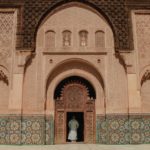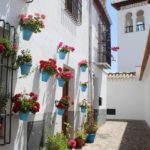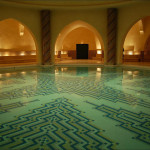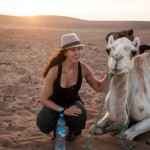Two Extremes: Discovering the Paradox of Femininity in Morocco
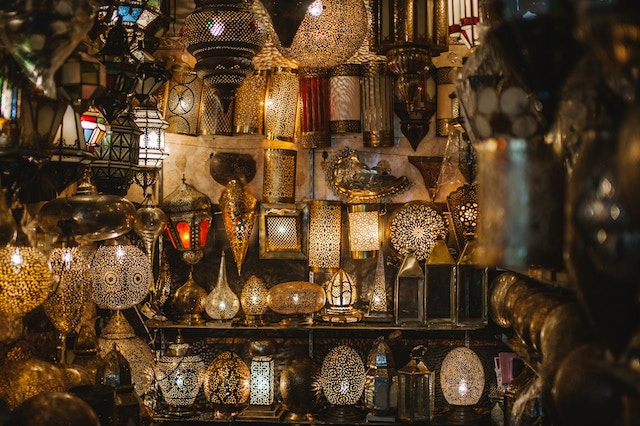
“I would never go by myself,” I heard myself say on numerous occasions. While making a mental list of desirable travel destinations, Morocco was a nation I had longed to visit ever since my high-school French teacher informed our class of the country´s Francophone population. I had decided that although I love–and prefer–to travel on my own, Morocco would be a country I would see with someone else. As a solo female traveler in a predominantly Muslim nation, I felt safest planning my journey with a companion.
Weeks later, my friend Maria and I landed in Fes, a city that was new to Maria (she had visited Marrakesh months prior) in a country that was new to me. “We have to go to a hammam,” Maria told me. She had praised this Moroccan tradition ever since we decided to visit.
Moroccan women did not hide behind their yards of fabric. Instead, they used them as a canvas to express their individuality.
Maria explained a hammam is a sort-of spa with steam rooms, massage tables, masques and other spa-like sundries that can be found at similar establishments I had visited in the States. As I typically do when visualizing a future trip, I created an elaborate scene of what may unfold before us in this Arabic spa. High ceilings, wall-less room with dipping pools, a standard women’s locker room with nudity around every corner.
I had only been to two other non-American spas: one in Reykjavik and the other in Budapest. In my fantasy of the very-near future, I combined those two settings, turned back the date dial about 1,000 years, and only then was I able to “accurately” envision our experience…or so I thought.
“Arrêtez-vous ici, s’il vous plait.” I asked our driver to stop just outside the gates of the medina, not quite confident in our location but determined that Maria and I—two confident, resourceful young women—would find our way to the family-run riad where we would spend the next few days.
As Maria and I took our first stroll through the ancient medina—the largest car-free urban zone in the world—I took notice of how the local women were dressed. Moroccan women did not hide behind their yards of fabric. Instead, they used them as a canvas to express their individuality. Bright colors, prints, and smiling faces paraded through the tiny alleyways. The women were not concerned with warding off men but rather they embraced their unique ensembles and celebrated their ability to display their distinctive personalities.
Massages, mud masques, aromatherapy, and other treatments leapt from the menu of luxury, while a soft scent of lavender caressed our nostrils.
After a day or two of exploring Fes on our own while fending off the gawking and ogling of Moroccan men, Maria and I solicited the assistance of the teenage girl who lived in our riad in an attempt to visit a traditional Moroccan hammam. Rather than tell us the name or address of her recommendation as a tourism office would do, she immediately led us out of the riad. “Suivez-moi,” she said, motioning for us to follow her.
Two minutes on foot later, we shimmied between chairs and tables of a restaurant patio and reached a pair of towering wooden doors. Behind the doors was a reception desk of sorts where a young woman welcomed us, took our names, and presented to us a list of services from which we could choose. Massages, mud masques, aromatherapy, and other treatments leapt from the menu of luxury, while a soft scent of lavender caressed our nostrils. I was relaxed already.
We made an appointment for two steam-room visits (including a mud and oil masque) as well as two 60-minute massages, all for 500 dirham (or about 50 USD). The next day we returned, ready to indulge in the intoxicating ritual where visitors shed their modesty along with their decorative drapery. As an American who was raised to cover up when around other people, no matter the setting, it took a bit of traveler’s courage to strip down and immerse myself in what some Moroccan women consider a daily routine.
Check out Pink Pangea’s Writing, Yoga, and Meditation Retreats.
Maria and I were led into a small rectangular room where we dropped our belongings (and our clothes) before entering the sauna. Once inside the steam-filled space, there was just enough room for two stone “beds” to be separated by a walled fountain from which hot water overflowed the basin below, eventually spilling onto the floor. As the sounds of the gushing water drowned out the clamoring from the medina outside, we felt like we were in the middle of an Amazon rain forest rather than in a bustling Moroccan market.
A few seconds later, the attending woman entered wearing nothing but a pair of rubber flip-flops. She filled her basin with the scorching water and proceeded to pour it over Maria and me as we sat perched on our respective stone beds. What ensued were two rubdowns: one with Moroccan oil and the other with a clay-mud mixture.
The paradoxical way these women physically disclosed everything behind closed doors yet concealed themselves so meticulously when outside the doors had me puzzled.
As the woman covered my body with a layer of mud, I closed my eyes and exhaled a breath that I had been holding for a bit too long. There I was, lying on a stone slab, completely exposed and vulnerable. Although the hard surface of the veritable bench was anything but comfortable, I couldn’t ignore the calming sense of feminine liberation.
The paradoxical way these women physically disclosed everything behind closed doors yet concealed themselves so meticulously when outside the doors had me puzzled. My cultural background hinged on moderation, but in this society it seemed like women waded between two extremes.
I admired the ability of Moroccan women to appreciate their bodies both covered and uncovered. Men may not take notice of this transformation from cloaked to bare, but as a woman I felt free in the hammam that day, understanding the meaning of this ritual that had ignited in me a spark of feminine pride.
Two Extremes: Discovering the Paradox of Femininity in Morocco

